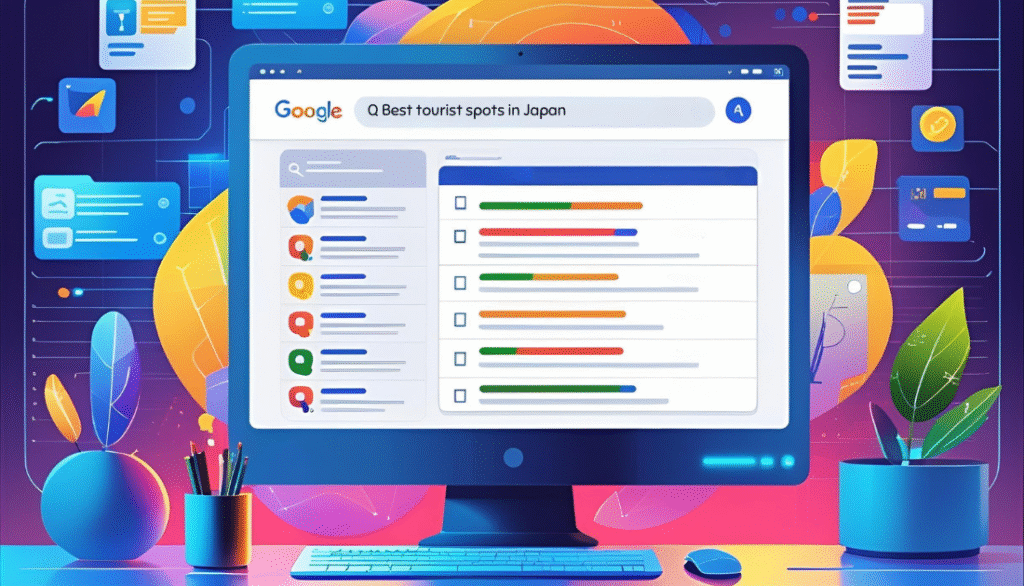Google has launched Web Guide, a new experimental feature in Search Labs that reimagines how users interact with search results.
Highlights
- Context-Driven Results: Web Guide organizes search results into thematic groups rather than traditional link lists—making it ideal for complex or exploratory queries.
- Powered by Gemini + Query Fan-Out: A combination of Google’s Gemini LLM and an internal “fan-out” method creates intelligent clusters from related sub-queries.
- Better Exploration for Users: Queries like “solo travel in Japan” are broken into browsable sections such as safety tips, real stories, and guides—offering layered insights in one view.
- Still Shows Source Links: Unlike AI Overviews, Web Guide maintains clickable links for each result, preserving user choice and publisher visibility.
- Early Access via Search Labs: Available only through Google’s Search Labs (opt-in), with toggles to switch back to the standard Web results interface.
- Cleaner Interface, Mixed Feedback: Users appreciate the categorized layout, though some find AI-generated summaries under each group repetitive.
- Publisher Impacts Still Unclear: Although links are preserved, concerns remain over reduced direct traffic due to the clustering and sectioning of content.
- Designed as a Hybrid Solution: Web Guide offers a middle path between static lists and full generative responses—balancing transparency with AI assistance.
- Strategic but Experimental: Part of Google’s broader vision to evolve search into a personalized knowledge discovery tool alongside other Search Labs features.
Instead of a traditional vertical list of links, Web Guide clusters web pages into thematic groups, offering a more structured and contextual browsing experience—particularly useful for complex or open-ended queries.
Built using Google’s Gemini AI model, the feature introduces a categorization method internally described as a variation of the “fan-out” technique. This approach allows users to explore broader perspectives without needing to rephrase or narrow their queries.
Smarter Search for Complex Queries
Web Guide is designed to excel in handling multi-part or exploratory search queries. For example, searching for “how to solo travel in Japan” might present users with sections like “comprehensive guides,” “personal experiences,” and “safety tips”—each visually segmented and easy to navigate.
Similarly, questions like “how to stay close with family across time zones” can be broken down into thematic groupings such as communication tools, routines, or apps.
This categorized structure makes search more intuitive by surfacing diverse types of content in parallel, tailored to varying user intents.
Gemini Meets Query Fan-Out
At its core, Web Guide is powered by a custom-tuned version of Gemini, Google’s large language model. It combines this with query fan-out, a method where multiple related searches are generated behind the scenes and grouped by theme.
For instance, one query might be broken into related concepts like travel logistics, real-world tips, or cultural considerations.
This process enables the interface to respond not with a single ranked list, but with a mosaic of organized results that better reflect the complexity of the question.
Opt-In Rollout via Search Labs
Currently, Web Guide is available only through Search Labs and appears in the Web tab for opted-in users. It features a toggle that allows users to switch back to standard results without leaving the experience.
According to Google, the feature is expected to gradually roll out to the “All” tab, which handles the majority of search traffic, pending user feedback and performance metrics.
Interface Highlights and Initial Feedback
Unlike AI Overviews, which summarize answers and may obscure direct links, Web Guide keeps source links prominently displayed and offers optional “load more” functionality within each category. This allows users to quickly scan or explore deeper without losing context.
Early feedback has highlighted the feature’s intuitive layout, though some users note that AI-generated descriptions under each section can occasionally feel redundant or unnecessary.
Addressing Publisher Concerns
While Web Guide preserves clickable links—unlike fully generated AI summaries—it still raises questions about potential traffic diversion.
Some publishers and analysts worry that clustering links under broader AI-generated headings might reduce direct engagement with original content, continuing concerns first raised during the rollout of AI Overviews.
By focusing on organization rather than content generation, Web Guide may mitigate some of that tension, though its long-term impact on publisher traffic remains to be seen.
Designed as a Hybrid Solution
Web Guide appears to be Google’s attempt to balance AI-enhanced discovery with traditional web linking, offering a middle ground between static search results and full generative answers.
This approach also positions Google to respond to ongoing criticism about transparency and content ownership, particularly in light of regulatory scrutiny and industry feedback around AI Overviews.
Currently this is part of a suite of Search Labs experiments—alongside tools like AI Mode, Notebook LM, and Flow (an AI-powered storytelling tool).


